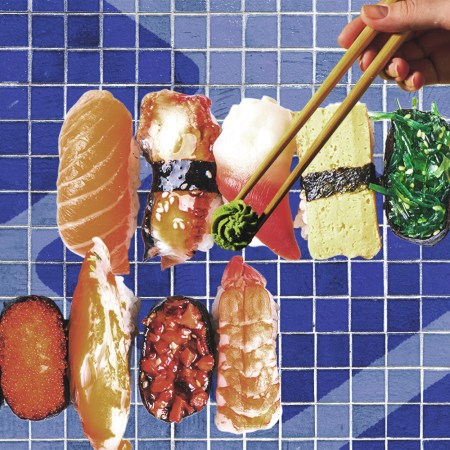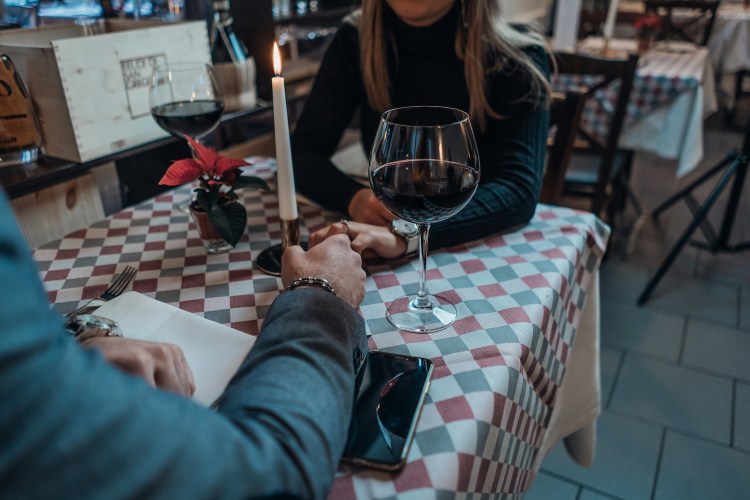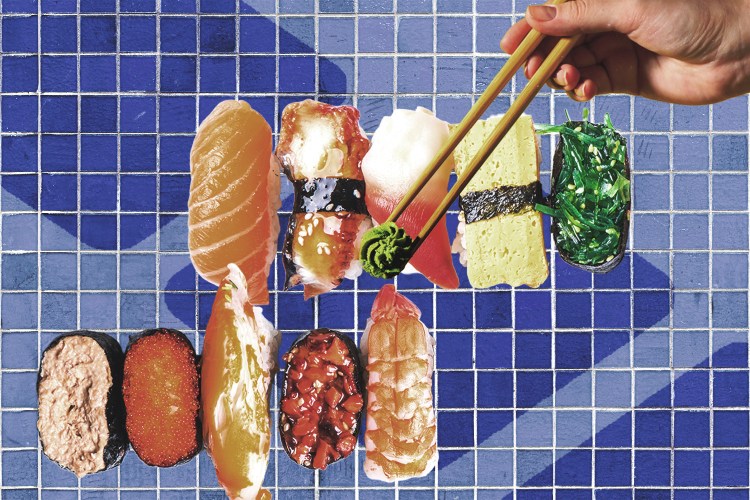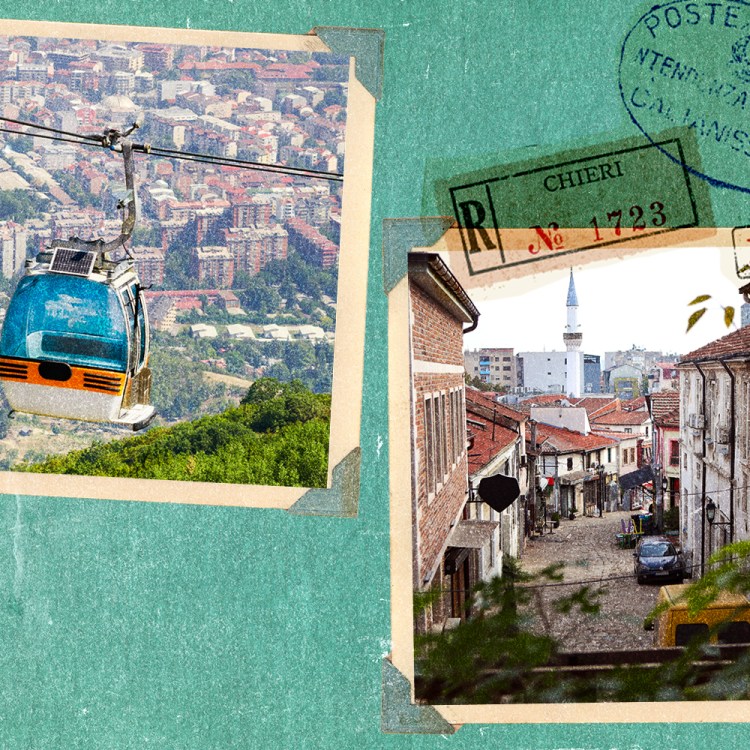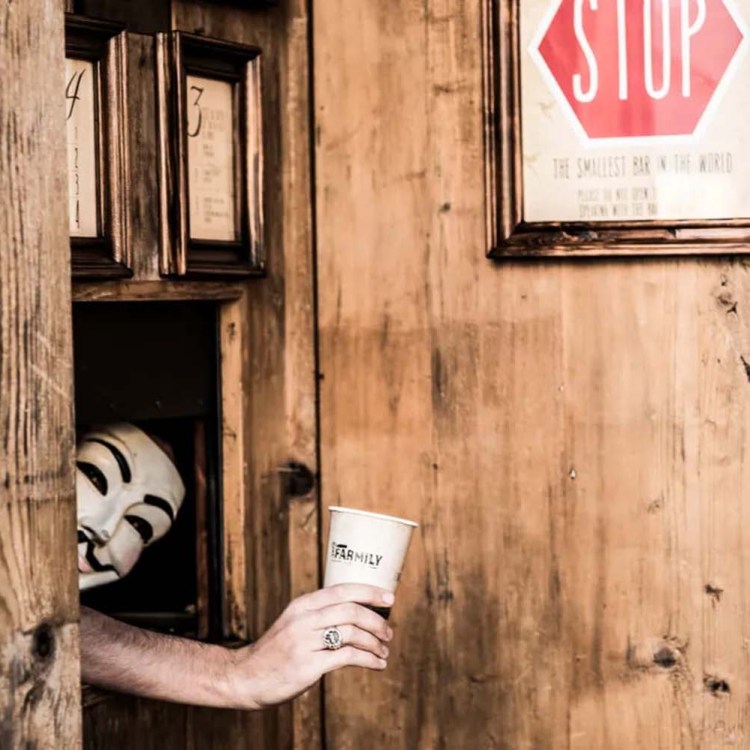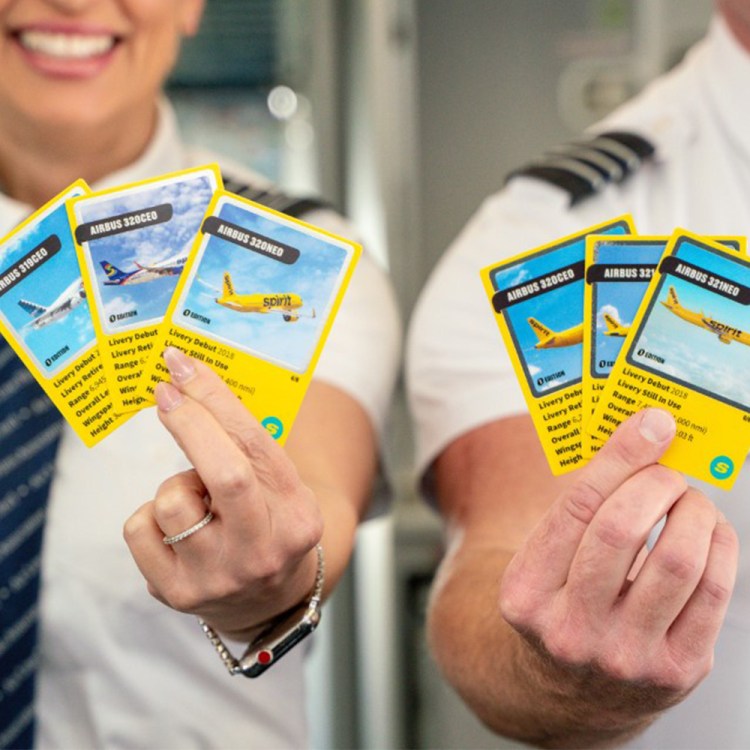Perusing Instagram we often come across meaningful quotes attributed to everyone from Gandhi to Jesus to Marilyn Monroe…but these simple words from explorer, shark whisperer, caver diver, expedition leader and all around ocean goddess Cristina Zenato strike me more than most I’ve read: “My passion is as deep as the abyss of our oceans, as vast as the surface of this water planet, as ready to move and adapt as water and strong enough to take down any obstacles in its path.” Sorry Buddha, I think she’s got you there. May we all aspire to find such meaningful life experiences that our dialogue drips with passion and those around us feel the vibrant weight of our words when asked about what enchants us in life.
Cristina has spent 24 years diving with sharks in the Bahamas. That’s longer than most marriages and many friendships these days. She knows them by name. She knows them by touch. She knows their scars and their life stories. To Cristina, these animals are friends, family, a community. They are respected peers in an aqueous world that she calls home. Minus some gills and a few scales, this lady is as part fish as it gets.
Through her interactions, she offers the world a completely different energy surrounding sharks. One we don’t often witness in the over-hyped and dramatized world of television and media. She is a neoprened and chain-mailed crusader for their honor and their dignity.
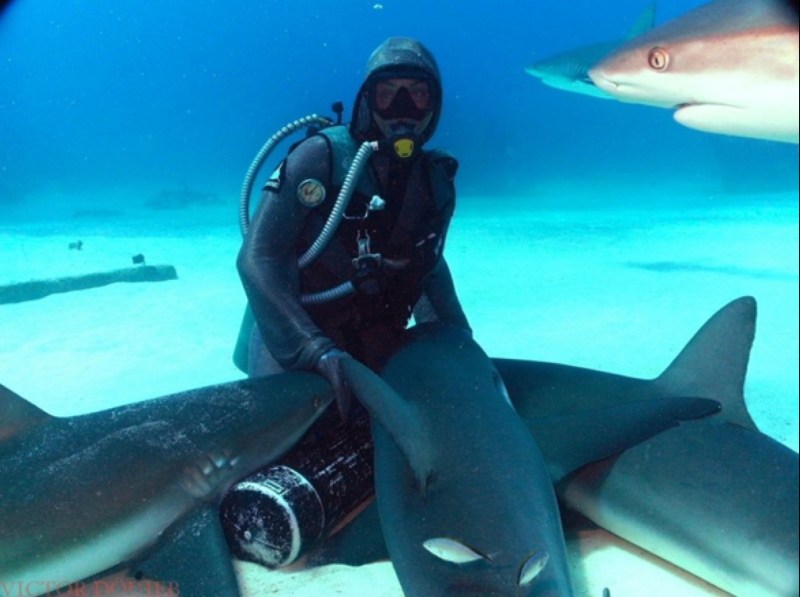
How Cristina describes her communication with sharks, I’m reminded of the movie Arrival. Is it all that different communicating with another species on this earth? A language barrier is a language barrier after all…and our need to communicate with life on our shared plant is as valuable as the need to communicate with life from others…even more I would think. We’re all in this together.
Her work with sharks is enough to fill a book and compile a lifetime of extraordinary experiences giving some of us a tinge of envy, but for one with the passionate heart of an explorer, there is more. Cristina is also an experienced cave diver, having mapped out underwater labyrinths that have eluded even the most seasoned and dedicated divers.
Again, her words on the experience are poetic and go far beyond the depths of a cave and strike at the core of the human experience. “I never enter with expectations. Expectations create disappointment. Exploration is a series of failed attempts, of many trials and at times continued dead leads. Entering a cave needs to be done for the experience in itself, in that moment, not for an ultimate goal or achievement.” She might be speaking about caves, but my heart skips a beat at the profound sentiment of her words.
I’ve heard about Cristina for years. I’ve been told she has an uncanny ability with animals, an energy about her that is different and elevated. I read her answers to my questions and I understood. I’ve written a lot of stories and I’ve interviewed a lot of people, but something in the energy of her words and how she lives her life transcends beyond the topics at hand and gives her words significance on a grand scale. She is the Deepak Chopra of the deep. If we can all aspire to be even half as passionate about our own lives as Cristina is about hers, we might begin to sound like a Shakespearean play. Melodious and fervent. Writing this story, I became more grateful than ever that the world’s oceans, sharks, and bad ass women have such an eloquent and dedicated mascot and champion.
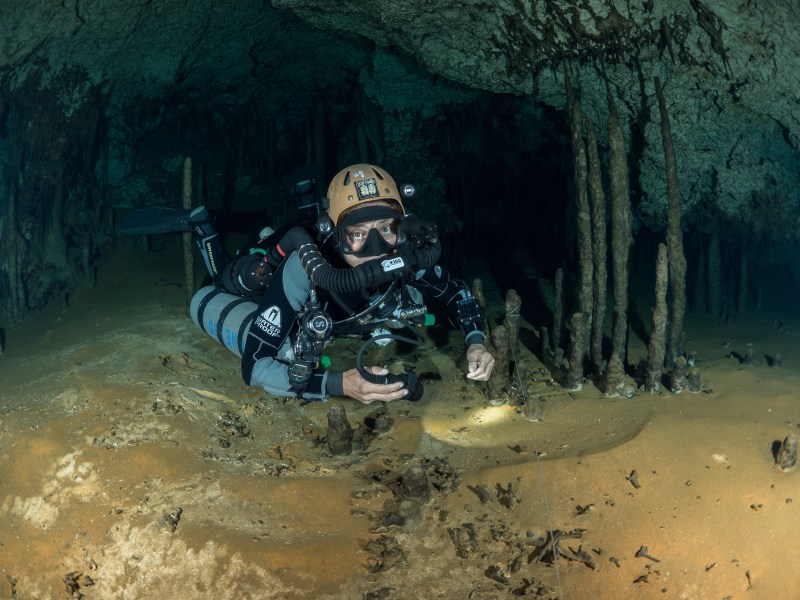
Passion is a powerful driving force for people. How did yours develop and mold who you are and what you do?
Cristina Zenato: Passion is my energy and my fundamental passion is for life, in all its forms, shapes and environments. When I go for something, I go full body and spirit into it. I do not do half things, it’s either full way or no way. I am not sure where my driving force comes from, I do believe we are born with passion inside us, we just need to find the fuel that lights the fire to make our passion burn and our hearts sing. I was fortunate enough to have parents who were passionate about water and introduced me to the water at a very young age. Once they dipped my toes into it, it just flooded through my body and a lifelong commitment to my passion for anything water was started. I can’t recall when I first time I started to walk, but I can tell with certainty when I received my first pair of fins and my first mask when I watched my dad flow through the water column and desired to follow him promptly. Once that passion was triggered it was never stopped, it was actually facilitated; I remember the day I told my parents I was leaving everything behind to follow my passion for the ocean to the Bahamas and they simply said “go.”
Once I found myself fully immersed in the ocean and its beauty I became totally addicted to it. The more time I spent in the water and under the water the more time I wanted and the more complete I felt. I realized I had found my place, my home, my spiritual peace. Years later I remarked that I was not very good at relationships as they never seemed to last long and one former student and now dear friend of mine replied that she thought I was the most faithful person she had ever encountered in her life and that still inspired her. She saw me married to the ocean and to my life as it was and completely dedicated to it, no matter what.
I fuel my passion every day, I breathe the ocean, I feel the ocean, I sit on the roof of the boat and look at the horizon realizing it’s the beginning of my world, not the end. My passion is as deep as the abyss of our oceans, as vast as the surface of this water planet, as ready to move and adapt as water and strong enough to take down any obstacles in its path.
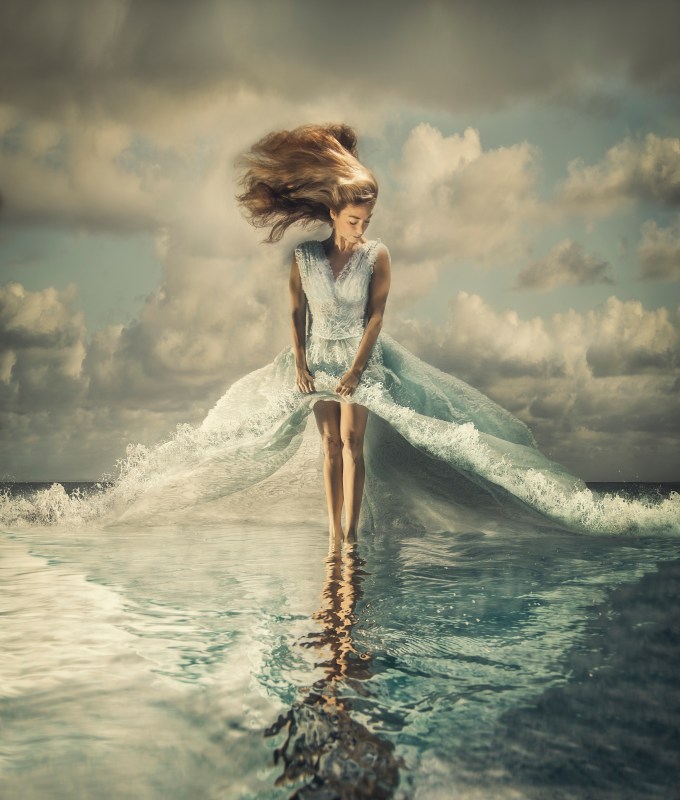
Those who know you claim you have a spiritual connection to sharks that they have never seen before. Describe this connection from your perspective.
CZ: When I look at a shark I see a living being, an individual, I connect to a mind and personality I feel a soul. At times, I feel the fears and pain and it hurts me to not be able to always help. Sharks for me have one of the purest souls I have encountered and nothing is vicious about them. I miss them when I am gone, I dislike not being able to see more and share more, our time underwater is so limited no matter how many thousands of hours I have spent with them, I still share a minimal part of their world. When I enter the water and I am with them I am happy and comfortable, I am with someone I can trust, I am home. Sharks bring me serenity and peace, it’s almost as if they had a hypnotic effect on me rather than me on them.
Tell me about the act of putting a shark into tonic immobility.
CZ: Tonic immobility is a natural reaction of an animal to stress or threat, so I try not to call it TI when referring to what I do with sharks because I know I do not cause stress or threat. I prefer to call it a relaxed state of the shark. The relationship I have with these sharks is one of repeated presence and behavior. I have been diving and interacting with them in the same place for the last twenty-four years. What I have done with them is what I prefer to call “imprinting” through my presence and constant behavior. These are sharks I know and some of them I have known for at least ten years. One of them, Stompy, eleven. I have watched them show up on the dive, decide to stay and I have watched them grow into mature adults. I have watched them swim away during mating season and come back all scarred up as sharks are after the mating season and I watched their bellies grow during the pregnancies and a year later witnessed them leave again and come back all nice and slim after giving birth. And I am watching the next generation as we speak, from when they first showed up to the moment they decided to approach me. As we start spending more and more time together and we come in contact with each other some of them seem to develop a higher interest in wanting to be touched and swim into me. They naturally sink to the ocean floor once they stop swimming, that’s the reason why you see me always kneeling down with a shark in my lap. What we have it’s just that: a decision of the shark of wanting to be petted, my touch and my understanding that I am not to force the animal if she is not interested. “She” because all the sharks I interact with at this level are female, but for one male, “Mad Eye” who after many years started to relax and enjoy the touch but that, unfortunately, has been gone for the last two years. These sharks are my babies, each one of them with a personality and attitude, each one of them so unique to my eyes as could be twenty different people in a room. So putting the shark into a relaxed state is not an act but a part of our connection and a step into the dance that I share with them on the ocean floor.
You’ve said that you can feel what a shark needs or wants by how it responds to your touch. Can you elaborate on the experience of this exchange in energy and communication between a human and a fish that many people see as one of the “most feared animals on the planet?”
CZ: Touch is part of the way I communicate with sharks, touch or the lack of it is the way they communicate with me. Connect touch with body language, swimming patterns and speed of approach and you have a language. Communication is not only verbal, what it requires is knowledge and understanding. If somebody does not speak my language, verbalizing it louder won’t allow the person to understand it. However, if I change the way I use my words, or maybe use a drawing or an illustration, together with a gesture a complete foreigner to my language might understand what I am trying to say. It works the same with the sharks. What we need is to learn to understand their language and their process of thinking. We need to move over the preconceived notions that have been stuffed in our heads through wrongful and uneducated information. We need to move over the stigma that the word shark triggers in our brain and learn to actually see sharks as they are, animals with a complex communication systems, a role, an importance and a presence on this planet that far exceeds our own in millions and millions of years. What we need is the desire to understand and communicate using the language that can be understood by both parties. Through knowledge comes understanding and through understanding comes lack of fear.
Do you have a favorite species of shark to interact with?
CZ: Although there are other species of sharks I have interacted with, my favorite will always be the Caribbean Reef sharks, specifically my babies, in my little place under the waves off the coast of Grand Bahama Island.
You often dive with chainmail and you have mentioned that it blurs the barrier between you and the sharks. How so?
CZ: The chainmail is the barrier that drops down the barrier between me and the sharks. The same way a safety harness works when we go climbing, the suit is a responsible measure to wear when working with sharks and food. It is the harness that allows me to welcome the sharks into my lap. I believe it’s a tribute to my knowledge and respect for these animals. The amazing thing to observe is how I can stand in the middle of a school of sharks with food in my hands and never ever being bitten. But the suit is there to prevent what I call accidental bites. And one accidental bite would destroy everything I have built with these creatures. People would not appreciate that accidents might happen and one of them would obliterate twenty-four years of work. Instead with the suit I can feed, pet, interact and welcome them in my lap in complete respect of their nature and my knowledge. When I am not feeding and interacting I swim among them without any protection. Sometimes even after a feed and interactive dive I remove the chain-suit while still underwater and swim with them without any issues.
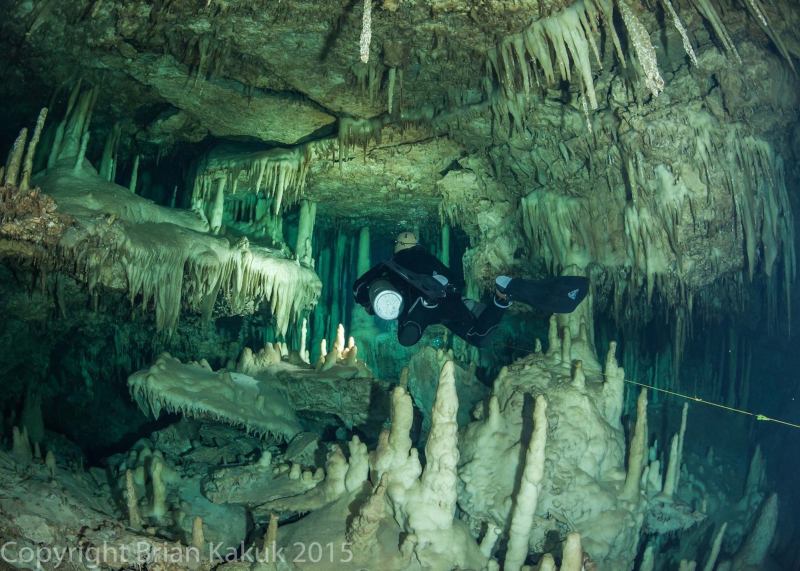
What is a key insight you would like for people to understand about sharks when all many people know is what they see on Shark Week?
CZ: That when we say “sharks” it is like saying “birds.” Not all birds can fly or nest in a tree, not all of them are black or can sing beautifully. There are over 500 species of sharks in almost all the oceans of this water planet, the smallest one fits in the palm of an average adult hand and the biggest one is fifty feet long and loves caviar (eats plankton). In between there are all sizes, all shapes and all kind of diets. It’s time we start to learn about them, where they are, what they do for a living, how they reproduce and eat and when it’s safe to be in the water with them and those few and rare occasions when water simply belongs to them. Once we start learning and understanding the different species and locations, we will realize and understand that the oceans are a very safe place to visit, that sharks don’t eat humans and we pose more of a threat to them than they pose to us.
Describe the feeling of being in physical contact with a shark using the five senses.
CZ: The shark comes into my stomach in a slow swim, it suddenly stops and gently sinks; I follow while holding her, then the head rests gently on my lap. I can feel her weight; I can feel her breathing, the rhythmic opening and closing of her jaw as she pumps water over her gills to “breathe.” Looking down on her I can see her story, the little scars left on her skin, the unique patterns of her color and the unique shape of her fins, here is Foggy Eye with her cloudy right eye, or Grandma with her light gray coloration like the hair of a grandma and the gentleness and peaceful swim typical of a slower older person. Light streams from the surface, glittering over the body of silver jacks or “goldening” over my sharks, as their amazing shadows cast in the white sand circle around me. Her body is strong and tight, the muscles prominent under my touch, her belly delicate and vulnerable. Under the kiss of my lips, her skin feels soft, her body feels warm. The familiar salty taste of the water pauses in and around my mouth. Around me the underwater world keeps crackling and popping and making all these amazing little noises, audible in between the breaths taken in and out of the regulator slower and slower. Then the moment comes to a standstill.
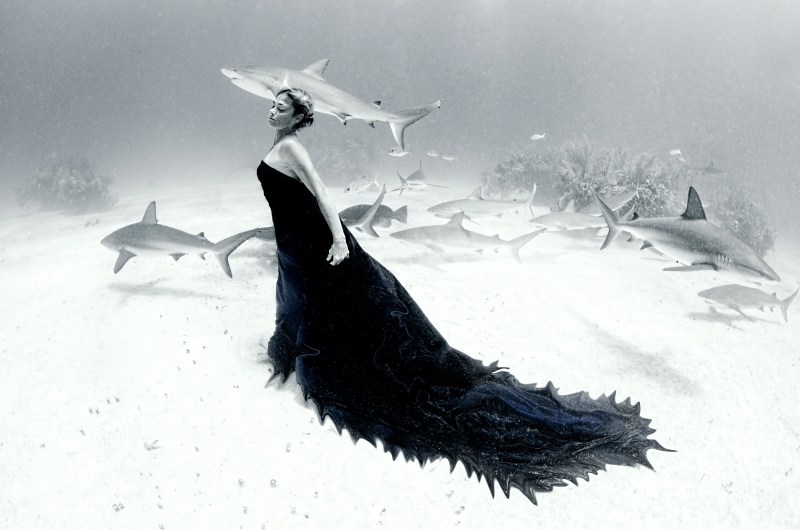
Tell us about your passion for cave diving and how you entered this space.
CZ: For me caves are this incredible book of the history of the planet. When I swim through them, I imagine sitting in an ancient library, opening the dusty pages of this huge book and finding information and maps of our underground world. Caves are the bookkeepers of their history, but also of our actions above and below the water. In the caves time does not tick in the traditional way. The eternal darkness, briefly interrupted by my presence, returns to its status quo and leaves that world unchanged. In the weightless darkness, I am ageless and ancient at the same time, I am young and old, I am. Caves allow me to just be. Be there in that moment, be myself, be suspended from pain, worries and distractions. Caves demand my undivided attention and if I listen carefully to each and every word they share so much.
I never enter with expectations. Expectations create disappointment. Exploration is a series of failed attempts, of many trials and at times continues dead leads. Entering a cave needs to be done for the experience in itself, in that moment, not for an ultimate goal or achievement. I never entered with the goal of reaching the end of the line, I enter with the intent of enjoying the journey, a journey that in the end has brought me to unique and unexplored places, when the time was the right one.
I entered my first cavern as my 11th dive ever. I was here on this island and went to dive Ben’s Cavern with my mentor Ben Rose, whom the cavern and cave were named after. There, floating in this incredibly crystal clear water, watching the sun rays coming through the entrance I fell in love with the feeling of flying. When I saw the crystals, stalactites and stalagmites, I fell in love with them, with darkness and beauty.
From there to become a cave diver and later a full cave diving instructor and furthermore a cave explorer it has been a continuous journey of self-discovery, training, following my passion, keep learning and keep questioning. I looked, stopped, paused, listened, learned, then one day I found out I could hear and see something more and something different. I learned how to listen to the language of the caves.
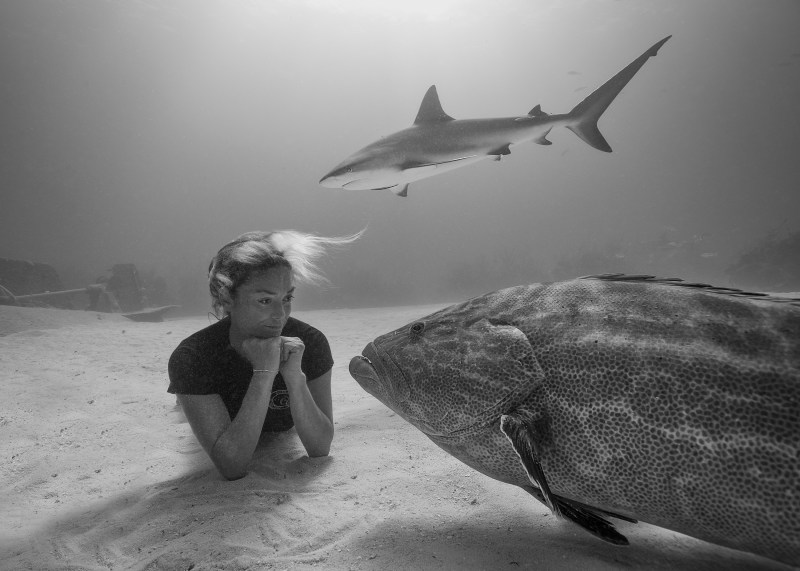
You recently connected two caves off Sweetings Cay via what you named the “Interstellar Tunnel.” What draws you to want to push yourself further than others have gone?
CZ: There is something magical about the sound of an exploratory reel unspooling in your hand as you swim through dark places where no one else in this world has ever been before. There is the anticipation and desire to find beauty and magic and knowledge. The first feeling is the one of discovery, I just love caves and trying to understand them and read them, finding new tunnels and new areas is like landing on the moon for the first time, over and over. I have an amazing moon right on this planet, right under our feet. I love to learn from the cave, to listen to its story, to find the connections that were missed by previous visitors who may have passed by too fast or not interested enough. There is beauty in these caves, there is science, there is history and discovery. While learning about them I also found out how delicate they could be and how fundamental they were in the health of entire ecosystems living even far away from them. It was natural that one of the reasons that pushed me to keep going and exploring has been directly connected with the protection of these caves, of our precious fresh water supply and ultimately the mangrove areas, the sharks and the oceans. Caves can reach further than we can ever think and they carry water and with it the pollutants and chemicals thrown away from distance places on land reach mangroves and lagoons. Mangroves are nursery grounds for an amazing array of marine life, from corals to juvenile fish, to juvenile sharks. The more I explored and learned the smaller the world became, the more connected the actions of each person, the bigger the consequences of those actions. It is very hard to love something if we don’t know it exists or we can’t see. With my work of exploration, survey and photography I try to show their beauty, share their story and highlight how everything we do is connected.
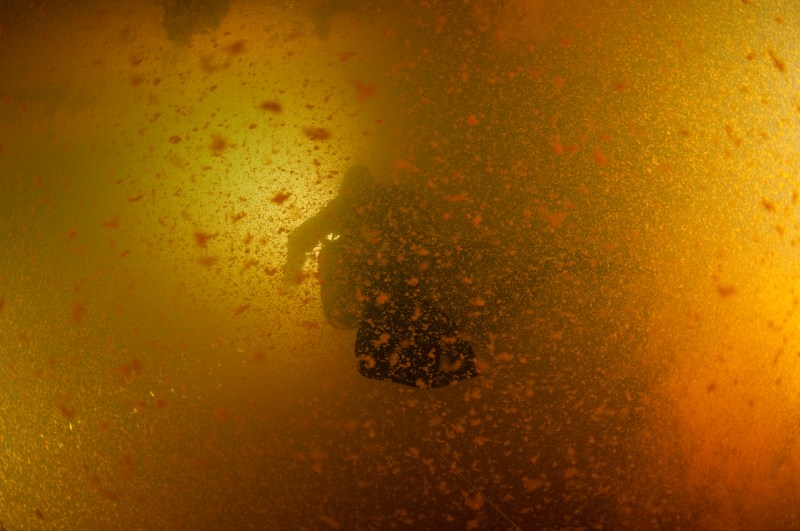
You are also credited with finding the connection between Mermaid Pond and Chimney Cave at Grand Bahama. What is the process of mapping an unexplored cave system safely?
CZ: It all starts with our capability of saying “No.” This could be easily applied to our lives, to the way we live and conduct our day to day tasks. Sometimes we are not able to say no and we find ourselves overwhelmed and depleted. I wish we could all learn that simple lesson from cave diving, because as a cave explorer I would never want to find myself miles inside these tunnels in an overwhelmed and depleted state of mind.
The basics of cave diving require training, carrying the correct kind and amount of gear and proficiency in skills such as buoyancy, trim, propulsion paired with a developed global awareness. They also require maturity and responsibility. When we cave dive we enjoy the cave because we have learned to never drop the guard. It’s a crafted balance between being aware of ourselves, our limits, the cave, like the direction of travel, depth, changes in structure, the instruments and gear we are using and carrying. The difficulties I encountered in that specific cave added to all I described above. This was a heavily polluted cave, with very bad visibility and unstable bacterial growth that made coming out like swimming through squeezed pulpy orange juice, slowing down any exploratory progress and making each action more complex and calculated. The first step is to carry a knotted line inside the area we are exploring, this is our Ariadne’s thread to the surface. It is knotted every ten feet for measuring distances and it has to be placed in the tunnels with two goals: ease of following out by touch in case of lost visibility, yet making sure it’s not too much in the way to cause entanglements. We then measure azimuth, distances and depths for every change in direction the line takes. Once surfaced we transfer all this data to paper with pencil, ruler, calculator and protractor and draw lines for the tunnels. Most recently technology has advanced so much that there are now instruments we can use and even software programs, but this is something so new for the main market, that I used a prototype on a National Geographic expedition in December 2015. While doing all of this underwater we need to keep track of time, depth, gas consumption and continuously check and verify that all our gear is functioning correctly. It is defined as task loading. To safely being able to do all of this we need to know when to turn around and head out, when to call the dive although the task hasn’t been completed, we need to be able to simply accept that it’s best to come back another day. It may sound simple while reading this, but imagine you have spent the previous day preparing your lines, your gas, your gear, you woke up at 5am to make sure everything was as needed, drove for an hour, caught a boat to transfer to the caves, spent another two hours carrying all the gear on your shoulders across the forest over hard terrain under the sweltering heat of the Bahamas sun, to swim with it for another half hour across a lagoon to reach the entrance of your cave and after ten minutes submerged having to call the dive for which ever safety reason may arise, or simply because you may feel you are not on your game for that day.
What is going through your mind when you are diving deep in a cave? Have you ever had any close calls when cave diving?
CZ: As I watch my light breaking through the darkness and see the darkness come right back after I have passed, I realize how transient we are compared to a cave. The cave was here way before me and will be here way after me. As I swim through its passageways I feel the power of now, of the moment, I enjoy being exactly where I am and noticing that my head is empty of anything else. I also feel powerful, ageless, peaceful and incredibly privileged to be able to see and discover these unique places. And while I admire the frozen in time beauty of these underground crystal castles, I keep monitoring everything that is necessary to keep me alive in such foreign environment. I sometimes say I am like a shark with seven senses gone cave diving, constantly receiving and analyzing inputs and data to formulate the best decision at every moment. As for close calls, I am not sure I can say I have. I have had tough moments, I have become stuck or I have come out in absolute zero visibility, but I have never considered those close calls. If the dive is planned and executed as per our training, those are just moments when the training needs to kick in and our clear mental state and focus function at its best. For it to be a close call it would have to cause distress, but distress in a cave kills, so I never allow my emotions to flare while cave diving, no matter the situation. I leave my emotional being for the above the water life (wink).
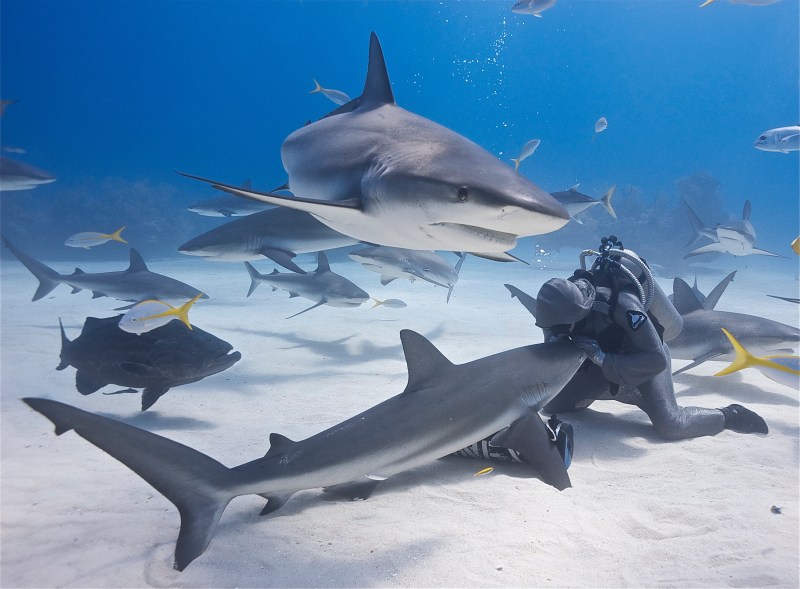
What’s it like to be a successful woman in a relatively male-dominated space?
CZ: I honestly don’t think about it in those terms. Since the beginning, I just went about my work and business and dealt with things as they came along. People around me found the need to label who I was and associate it with what I had accomplished. It is indeed true it was not always easy. I remember being the only woman on a boat full of divers, crew or guests, I remember the applause from guys when I correctly docked a boat, while nothing was said or done when a male co-worker would do it, I remember some of the comments said towards me from others in the industry. At the same time, I remember and appreciate those who have supported me because of my hard work and dedication, not the gender. I know that I had changed myself to fit better into this world, how I had denied some of my feminine side to show I was strong and worthy of it. Later I realized it was not necessary. The success is not for me, nor is it about me making it in a male-dominated world. What feels good is when I receive messages and notes from women, no matter the age, saying that what I do and I have accomplished is an inspiration for them to go and try for themselves. If that means being successful, then that is my success and I love it.
I am happy to be able to inspire and mentor other women, make them realize that what we want is available for us, we just need to want it hard it enough.
What do you feel like are your biggest professional and personal accomplishments to date?
CZ: In a world that demands us to be always somebody else I feel I have been able to remain the truest to myself that I could. I have listened to my personal values and desires and I have been able to carve a life that feels satisfactory to my standards. It is a rich life, but not in materialistic terms, it is a life rich of experiences, encounters, incredibly talented people I have shared so much with. It is a life of friends and young students drifting in and out of my apt, crashing on a couch of so many friends around the world, it is a life of experiences, of memories, of connections. It is also a life that has allowed me to share and contribute so much. The biggest accomplishments are in my day to day life, in the young people I once trained and mentored I meet as now grown diving professionals and stewards for the oceans, in how many I can reach and touch with my daily activity, with my examples, my choices and hopefully with my lead. My accomplishments are enclosed in boxes of thank you cards, drawings, messages, pictures received from anywhere, in the smile of people, in their desire to live and experience; they are present in my bare foot prints in the sand on a beach, erased a few seconds later by the ocean, in my sleeping giant rescue dogs resting by my side as I write this, in their chance to walk and run without leashes and limitations, in my salty, crispy hair, in my forever shorts and T-shirts, in my yoga mat under a tree facing the sunrise, in the sound of the wind through my windows…
Most people would be terrified to do what you do. So what terrifies you … if anything?
CZ: The conformity of a life focused on the sole scope of owning or becoming, a life that instead of being lived is full of “when” and “if,” of wasted time and missed opportunities. A life where conformity is the norm and we live by what we “should do” instead of what we “would love to do or be.” I have seen so many people unhappy living the life they should instead of the life they would love to. So they wait, when this lines up or that will happen, meanwhile life flows through our fingers like the water of a waterfall. I am afraid of having to “fit in” instead of being able to overflow. I am afraid of empty small talk and people who can’t play like children, of keeping appearances instead of being able to wear the heart on a sleeve.
Everyone has a message they put out into the world through their words, actions and lifestyle. What is yours?
CZ: You are a star thrower and your every action counts. You do not need to be a superhero to be one. Your action connected with the actions of every other single individual will become a group action, a movement with power and importance. Never underestimate your own power. In this vast world you may feel you make a small difference, but to somebody that difference may mean the world. I believe that in my lifestyle through daily actions, small and big as they are. Although I organize big beach cleanups, I always walk and pick up pieces of trash on the road, or on the beach, or in the forest. I also try to respond to each person writing me a message, a note, sending a question, because every single individual is important and we never know what difference we could make for a person by just saying few words back. I may not be able to save the world, but I try to save a little of my little world. I have adopted three dogs and I am fostering a fourth one, I host a few students per year, my apartment is a harbor with a stream of people coming through and crashing by.
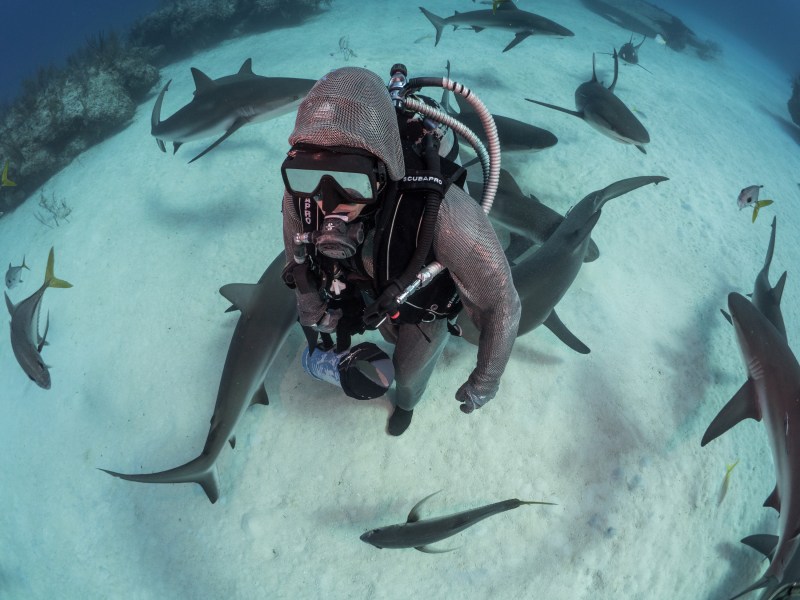
What future life goals do you have for the next five years? Any big bucket list items, travels, career goals, etc.
CZ: I have tried before to create long-term plans, but life seems to have a mind of its own and a way of evolving in different directions. Sometimes it comes in form of natural events like hurricane Matthew in 2016, which gave me a new view of some choices I was about to make.
I have two small plans in the making, but they are both coming up slowly, perhaps it’s not completely their time yet. I am currently writing a book, with the idea for two more in a drawer, this is going to be my focus in the next couple of years, followed by an educational project I can’t currently disclose but that would involve education and scuba diving at an even more involved level than now. In terms of travel, I try not to have bucket lists. I dream of one day seeing Iceland, it is a Country I dreamed of since I was a teenager, I might one day arrive there or not, maybe in between I will be able to see other places and they are not connected to only diving. I am a big lover of mountains and deserts. I let opportunities come up and be my choice when possible. Bucket lists prevent me from enjoying all I have here and now. I have in the past longed for expeditions and unique adventures, later realizing that I have expeditions and adventures every day, on my doorstep, that each time I drive to cave dive and share time with the sharks I am experiencing something new and amazing. Everything is here, right where I am, my dive site fidelity has been the best of the expeditions I have ever been involved with. I am standing on the bow of the boat and the space between me and the horizon is my world, my adventure, all I need.
Are there any questions you wish people would ask you or any message you would like to put out there?
CZ: Many send me questions on how to be able to do what I do or which path I followed along the way. It is difficult to tell somebody which road to follow. I had opportunities 24 years ago that are not available today anymore, but the young people today have opportunities I could have not dreamed of back then. I believe each one of us needs to find what makes us happy, understanding that life is “half choices.” In a way we can’t have it all, there is always a price to pay. I always use the example of a young man, can’t be both a family father and live a bachelor life at the same time. He can experience one and the other at different times of his life, that is what for me is a “half choice.” What is important for me is that when we pick our half we feel that for us is worth 100% if not always for the most part. There is no one path, there is no one easy way and there is always a price to pay. What I also want people to realize is that sometimes we need to take chances and opportunities even if they do not seem on the direct path of our goal. If we feel it is something we would love to do and experience, we should try to make it happen, we may never know when it will turn around to become exactly what we need. So look ahead and move forward, but never forget to also look where others have never looked, that is where I found the most amazing extensions for my cave explorations, not at the end of the line but along the way.
Why is offering courses, essentially inviting people into the worlds you love … those of sharks, caves and the essence of the underwater experience … an important way for you to invest your time in this life?
CZ: Offering courses is sharing my world, my views, my passions and my thoughts in a way that allow for the experience by the person to speak in my place.
When I share, I can show you why I love it and what makes me passionate about it. By experiencing in first person you do not have to listen to my word for it, you only look at the sparkle in my eyes when we surface, listen to the excited tone of my voice, follow the footsteps to find your own path.
Sharing knowledge allows me to open minds, to drop barriers, to dispel myths by showing the true reality. It’s the best way to create ambassadors, speakers for those who can’t speak, create witnesses of places many won’t be able to see in their lifetime.
I try to live my life by the famous Baba Dioum quote:
“In the end we will conserve only what we love; we will love only what we understand; and we will understand only what we are taught.”
That is where my Exploration-Education-Conservation comes from.
I explore the world to experience it, I educate myself over what I have found to share that same education with many others, in the hope we will all work towards its conservation thanks to the passion and love we have developed for it.
A thank you to you and your readers for having followed me on this small journey and for having allowed me to express so many different feelings and thoughts
This article appeared in an InsideHook newsletter. Sign up for free to get more on travel, wellness, style, drinking, and culture.










